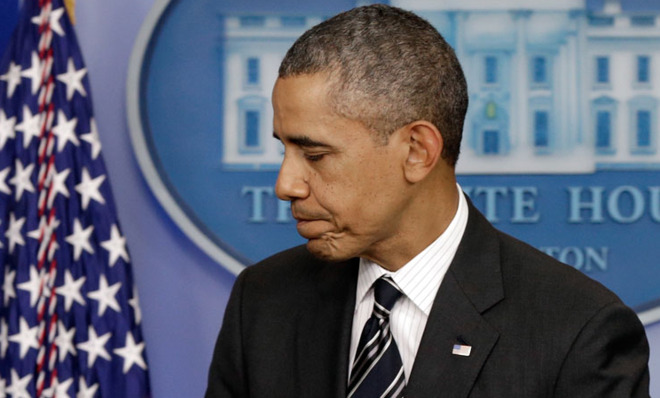Obama's last chance to explain his no-huddle offense


A free daily email with the biggest news stories of the day – and the best features from TheWeek.com
You are now subscribed
Your newsletter sign-up was successful
President Obama will make the case tonight for his decision to unleash the U.S. military on the Islamic State of Iraq and Syria (ISIS), the al Qaeda off-shoot that has torn through territory in the Mideast and proclaimed itself the stewards of a new caliphate.
Obama has used the bully pulpit to explain his choices before, but this speech belongs in a category that includes three other major foreign policy issues — his 2009 explanation for a temporary troop surge in Afghanistan, his 2011 decision to assist NATO in ousting Moammar Gadhafi, and his decision last year not to seek congressional permission to bomb Syria (and his subsequent decision not to punish Syria for its almost certain use of chemical weapons against innocents).
The White House sees tonight's speech as a chance to explain more than just the president's strategy — and even more than a chance to justify his evolution on how to confront ISIS, a trope the White House believes is driven into the fabric of public opinion by the media.
The Week
Escape your echo chamber. Get the facts behind the news, plus analysis from multiple perspectives.

Sign up for The Week's Free Newsletters
From our morning news briefing to a weekly Good News Newsletter, get the best of The Week delivered directly to your inbox.
From our morning news briefing to a weekly Good News Newsletter, get the best of The Week delivered directly to your inbox.
Broadly, Obama will try to explain what he's been up to all this time. Where are we in the world today? Why does it seem like America's influence has diminished considerably in the six years since he became president? Beyond the threat of ISIS, but using ISIS as a decision point, how strong and hearty a country are we?
Accepting the premise that the world is in a unique moment of crisis and that American has indeed lost power in the world, there are roughly three schools of criticism directed at the president now.
The first school — attended by many beltway Democrats and analysts — suggests that Obama is a bad leader, and that, as inextricably complicated as the world has become, his failure to rally Americans behind a common flag contributes significantly to the perception around the world that America has lost its edge. (Ron Fournier's columns are a good place to begin this curriculum.)
A second holds that Obama views the world as he wants it to be, and not as it is. This school includes those who believe that Obama has a pro-Muslim bent or is intent on deliberately weakening America.
A free daily email with the biggest news stories of the day – and the best features from TheWeek.com
A third (represented, say, by Vali Nasr), holds that Obama has made bad choices, overlearned the lessons of George W. Bush's invasion of Iraq, and managed the foreign policy process quite poorly. At this school, Obama's closest aides, Denis McDonough and Ben Rhodes, share the blame.
Of course, there are plenty of people outside of these three schools. There are those (Andrew Sullivan and Michael Cohen) who argue cogently that the problem is one of perception — that the grand filter between the president and the world has thickened so much that it is no longer possible for the president to appear to do anything right, that it is very difficult to comprehend the time horizon that Obama is looking toward, and that the American hangover from Iraq is still the most salient first fact to learn about the world. These folks are generally Obama defenders. They see the outlines of an Obama project, and they try to explain it in terms of humility and reality. When they do, it looks to the outside world that only a secret fraternity of Obama-whisperers has any comprehensive understanding of what Obama is actually doing. And that's no good.
It seems to many — myself included — that the president's advisers have stopped trying to explain because they believe that they have exhausted all means of explanation. They understand what's going on, so there must be a there there, but if the world refuses to see, for whatever reason, then Obama needs to spend less time explaining and more time executing. David Remnick wrote recently that Obama and his aides "take too much comfort in their sense of being misunderstood and stymied." You'll never get us. You'll never understand us. So why even try?
There is a kernel of truth here. Actually doing foreign policy is a lot like quarterbacking a team without the benefit of a huddle. You're always calling audibles at the line, and every play seems different, until the very end of the game. Presidents run the hurry-up offense.
And time and again, Americans seem to support Obama's policies while not giving him credit for devising and carrying them out.
This may be the last chance Obama has to close that gap.
So tonight, there will be plenty of discussion about the threat posed by ISIS, the decision to potentially expand air strikes into Syria, or to use special operations forces, and the time, treasure, and blood this all will take.
But as you watch the speech, try to look for the bigger picture.
Marc Ambinder is TheWeek.com's editor-at-large. He is the author, with D.B. Grady, of The Command and Deep State: Inside the Government Secrecy Industry. Marc is also a contributing editor for The Atlantic and GQ. Formerly, he served as White House correspondent for National Journal, chief political consultant for CBS News, and politics editor at The Atlantic. Marc is a 2001 graduate of Harvard. He is married to Michael Park, a corporate strategy consultant, and lives in Los Angeles.
